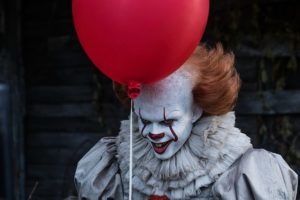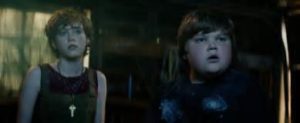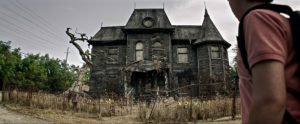
Bill Skarsgård
The evil that lurks in the sewers beneath Derry, Maine, has nothing on the evil lurking in the homes of that community. True, Pennywise (Bill Skarsgård), the murderous clown secretly terrorizing Derry, has the visual amplification of state-of-the-art CGI when it comes to the spiral of spiky teeth in his ever-expanding maw, and in manifesting the particular nightmares of his adolescent victims. Yet that and a dozen or so more effects of the same ilk have less of the whiff of pure evil than the close-up of a father’s hand inappropriately caressing his daughter’s hair while asking if she is still his little girl. This stripped down adaptation of Stephen King’s novel of the same name may lack the nuance and, hence, the crescendos of a true horror classic, but when it comes to zeroing in on the terror of a child’s helplessness, it has few peers.

Sophia Lillis, Jeremy Ray Taylor
The town of Derry has the distinction of children going missing at six times the national rate, but it takes the new kid in town, Benjamin (Jeremy Ray Taylor) to point it out to the town’s resident misfits, which is delightfully pointed comment about willful ignorance. Until he is taken in by those misfits after being assaulted by the staggeringly vicious local bully (Nicholas Hamilton), Benjamin has spent his time in the library learning the town’s history and being treated to some of the area’s special features, such as books that send messages that are not in print, and basements that hold more than storage items. A hopeless romantic, as well as intellectually curious, he has developed a crush on the local bad girl, Beverly (a radiant Sophia Lillis), for whom he becomes a pudgy mascot. He’s also the reason that she, too, is taken in by the local self-styled losers, whose natural leader is Bill (Jaeden Lieberher), a callow stutterer suffering the guilt of having made a paper boat for his brother, Georgie (Jackson Robert Scott), to float in the rainwater, an expedition from which he never returned
Adults have little place in their lives, or in the film, except to dole out disappointment and despair. These are kids who have absorbed the lesson that they are on their own, and perhaps better off that way. Even the best of them, the rabbi father of Stanley (Wyatt Oleff), is both literally and figuratively distant from his son. When he is seen at all, it is as he is standing in the temple’s balcony as his son practices a torah portion before the ark, and disparaging the attempt before sending him to replace the volume in his study, either ignorant or uncaring of the fact that Stanley is terrified of a painting there, a painting that delights in playing tricks on him.
 Derry is rife with such things. A slide projector with its own agenda; a spooky abandoned house, painted black and topped with the requisite mansard roof, that swings its door open when the most neurotic of the kids (Jack Dylan Grazer) bicycles by; a bathroom sink that becomes a geyser of blood. All are executed well, but smack of the cliché, no matter how sophisticated and emotionally resonant the performances from the kids, or how beautifully it is all photographed, particularly the way that everything goes just a scooch slo-mo when the boys see Beverly walking towards them, mimicking the absolute gobsmackdom that only boys on the cusp of puberty can experience in the presence of the girl that they all adore. As creepy as it is, the supernatural as a metaphor of the tension in these kids’ lives weakens that tension borne of bullying peers and abusive parents.
Derry is rife with such things. A slide projector with its own agenda; a spooky abandoned house, painted black and topped with the requisite mansard roof, that swings its door open when the most neurotic of the kids (Jack Dylan Grazer) bicycles by; a bathroom sink that becomes a geyser of blood. All are executed well, but smack of the cliché, no matter how sophisticated and emotionally resonant the performances from the kids, or how beautifully it is all photographed, particularly the way that everything goes just a scooch slo-mo when the boys see Beverly walking towards them, mimicking the absolute gobsmackdom that only boys on the cusp of puberty can experience in the presence of the girl that they all adore. As creepy as it is, the supernatural as a metaphor of the tension in these kids’ lives weakens that tension borne of bullying peers and abusive parents.
IT find its own greatest strength when the victimized band together to fight back. The rest is just so much window-dressing, a distracting sideshow left with a nagging sense of being unfinished as the screen fades to black at the end, and then pops up a title card that this is just chapter 1. Which also explains why the action takes place in 1990s.
Your Thoughts?